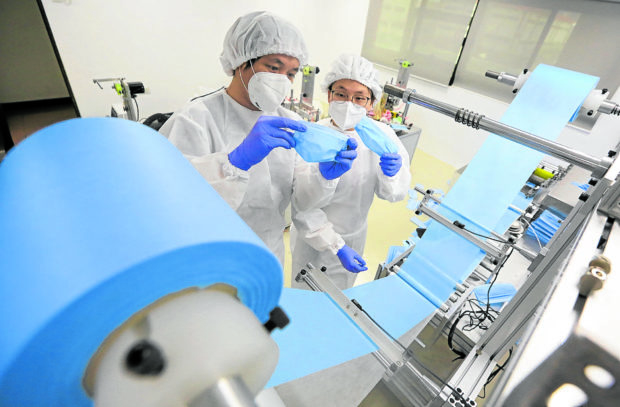
QUALITY CONTROL Surgical masks are inspected at a laboratory run by the Rosita Soliman Foundation before their distribution to medical stores. —MARIANNE BERMUDEZ
MANILA, Philippines — The Department of Health (DOH) was finally able to conduct more than 8,000 tests for the coronavirus disease (COVID-19) in a day after it missed that original target by 10 days.
Health Undersecretary Maria Rosario Vergeire said that on Sunday, the 26 accredited laboratories across the country were able to conduct a total 8,637 tests, bringing the current total number of tests done since February to 173,144.
This is the first time that the DOH was able to process more than its targeted 8,000 tests in a day as announced on April 30.
While Vergeire did not provide details on what was done to scale up the daily testing capacity, DOH data showed that the Research Institute for Tropical Medicine (RITM) and the Philippine Red Cross (PRC) helped drive up the numbers.
From May 6 to 9, the RITM averaged 603 tests, while the PRC had 1,786. On Sunday, the RITM processed 1,463 tests, while the PRC did 3,686 tests.
Case update
As of Monday, there were 292 new recorded cases of COVID-19 nationwide, bringing the current total to 11,086. More than half of the cases, or 162, are in Metro Manila, while a quarter or 74 are in Central Visayas.
There are now 1,999 patients who have recovered from COVID-19 with the latest addition of 75. The death toll, however, is now 726 as seven more patients succumbed to the severe respiratory disease.
The percentage of health-care workers who have contracted the SARS-CoV-2 virus, which causes COVID-19, slightly dropped to around 18 percent from 20 percent in the past two weeks. There are currently a total of 1,991 medical front-liners who tested positive for the virus, of which 584 have recovered and 34 have died.
Even as the country has seen a slight improvement in its testing capacity, Vergeire reminded the public that testing is not the end-all and be-all of the government’s strategy to respond to the COVID-19 outbreak.
“We cannot focus on testing labs alone because we have to be able to do more than just know who is infected. This is why we continue to set up isolation centers across the country,” she said in her online press briefing on Monday.
“Early detection and isolation of new COVID-19 cases is critical to managing potential outbreaks, especially as the government is considering gradually lifting quarantine measures,” she said.
ADB assistance
To date, there were already a total of 41,634 beds in the local government-run isolation centers, and 1,348 beds in quarantines managed by the government.
Asian Development Bank (ADB), which took part in the press briefing, said that apart from setting up a COVID-19 laboratory at Jose B. Lingad Memorial Regional Hospital in Pampanga province, it will also allot around $125 million (P6.3 billion) to help the Philippines “scale up the health response against COVID-19.”
According to ADB country representative Kelly Bird, the amount would fund the construction of two state-of-the-art laboratories and training of laboratory technicians.
“This project also includes scaling up testing and equipment supplies that will be distributed to other public hospitals. It will also include renovating and constructing new isolation wards [in] selected public hospitals. It will be a comprehensive project supporting the DOH in scaling up its response,” Bird said. INQ

